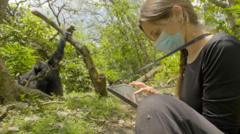In the lush woodlands of Southwest Virginia, a group of local farmers is actively working to revive a long-standing tradition: the harvesting and selling of herbal supplements and remedies that are deeply rooted in Appalachian culture. Led by individuals like Dr. Ryan Huish, a biology professor at the University of Virginia’s College at Wise, the initiative aims to create a more sustainable and profitable herbal market while preserving essential cultural legacies.
As Dr. Huish guides students through the diverse flora of his 60-acre family property in Duffield, he emphasizes the importance of local plants. These include unique edibles such as ramps, trout lilies, and Appalachian wasabi—plants that have served as food and medicinal resources for centuries. However, the herbal economy has suffered from lack of regulation, leading to issues such as overharvesting and low market prices for vendors.
Katie Commender, director of the agroforestry program at the Appalachian Harvest Herb Hub, notes that the trade of forest botanicals has persisted for over 300 years in the Appalachian Mountains. Yet, she expresses concern for the future of these traditions as they struggle to reach and resonate with younger generations.
This initiative is part of a broader series titled "50 States, 50 Fixes," aimed at highlighting local solutions to environmental and economic challenges. The commitment of these Virginians to cultivate both the land and their heritage reinforces the notion that by blending tradition with innovation, rural economies can be sustainably revitalized and preserved for future generations.
As Dr. Huish guides students through the diverse flora of his 60-acre family property in Duffield, he emphasizes the importance of local plants. These include unique edibles such as ramps, trout lilies, and Appalachian wasabi—plants that have served as food and medicinal resources for centuries. However, the herbal economy has suffered from lack of regulation, leading to issues such as overharvesting and low market prices for vendors.
Katie Commender, director of the agroforestry program at the Appalachian Harvest Herb Hub, notes that the trade of forest botanicals has persisted for over 300 years in the Appalachian Mountains. Yet, she expresses concern for the future of these traditions as they struggle to reach and resonate with younger generations.
This initiative is part of a broader series titled "50 States, 50 Fixes," aimed at highlighting local solutions to environmental and economic challenges. The commitment of these Virginians to cultivate both the land and their heritage reinforces the notion that by blending tradition with innovation, rural economies can be sustainably revitalized and preserved for future generations.





















